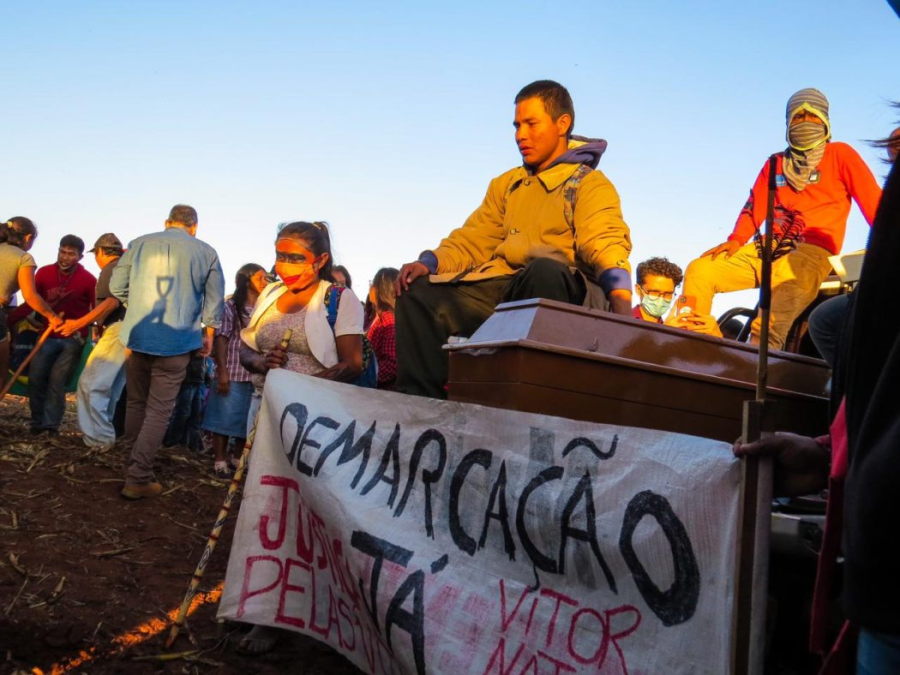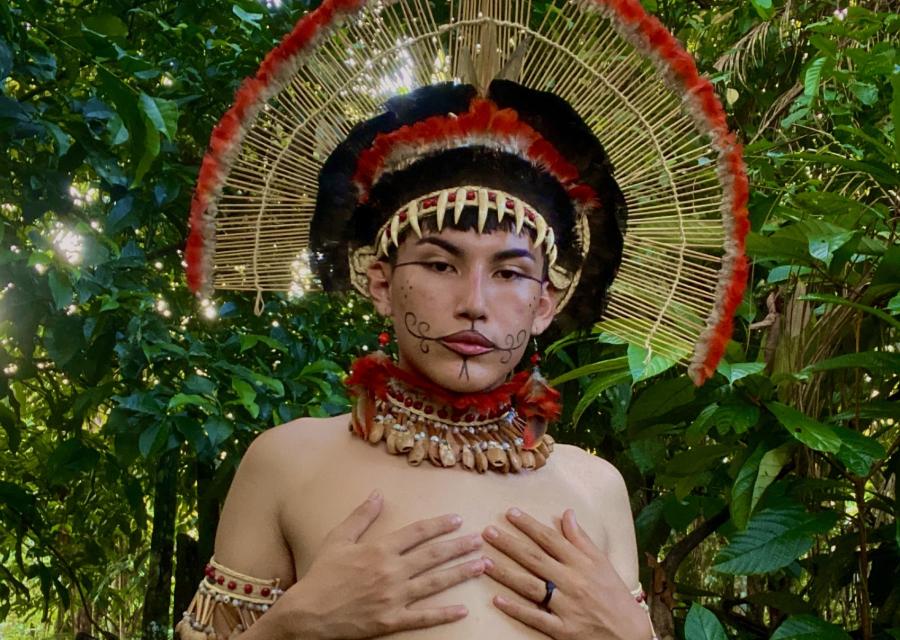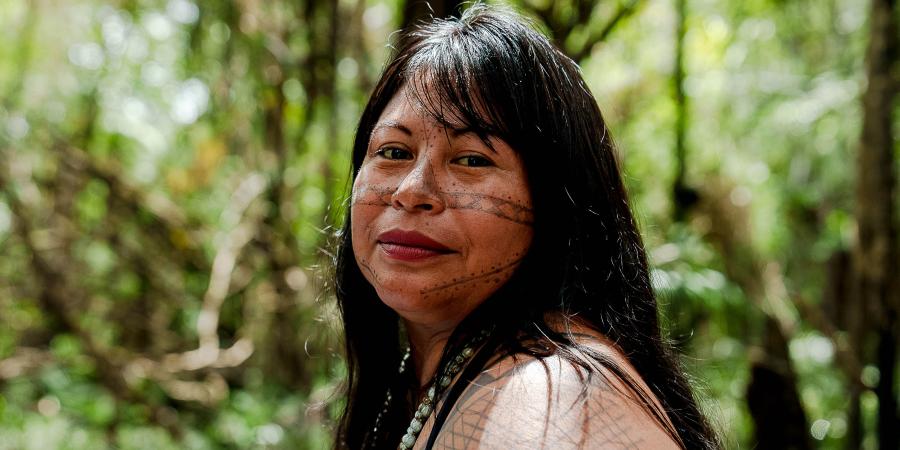On behalf of all Brazilian Indians, representatives of several indigenous groups presented a proposed text on indigenous rights to be included in Brazil's New Constitution. More than 60 Indians from the Xavante, Kraho, Txucarramae, Karaja, Canoeiro and Terena nations participated in a series of formal events which made up their constitutional lobby on April 22 and 23. The delegation was coordinated by the Union of Indigenous Nations (UNI).
In the presence of the entire delegation, the proposal was submitted by indigenous leaders Idjarruri (Karaja), Raoni (Txucarramae), Mario Juruna (Xavante) and Marcos Terena to those who will be writing that portion of the Constitution dealing with indigenous affairs: the subcommissioner for Blacks, Indigenous Populations, the Handicapped and Minorities. Accompanied by moving speeches from Kraho and Xavante leaders, the proposal was also given to the leader of the Constitutional Assembly's majority party, Senator Mario Covas. The Indians also met with other National Party leaders.
Late in the afternoon of April 22, after a series of speeches by Ailton Krenak (UNI) and members of the subcommission. Raoni led an animated, singing group of Txucarramae into the office of Ulysses Guimaraes, president of the Constitutional Assembly. Amid the singing, clapping of hands and jostling press, the Indians crowned Guimaraes with a Txucarramae feather headdress. At sunset, the Indians moved outside to the platform of the National Congress. There, between the two semicircular domes of the Senate and the House, the Txucarramae sang and danced while four Shamans blew smoke over the president of the Subcommission on Minorities, Senator Ivo Leach, thereby removing any unfavorable influences that might affect the future of their proposal.
The other indigenous representative maintained their resolve not to sing, dance or celebrate until their rights have been guaranteed in the New Constitution. The Xavante asserted that "this is not the time for festivities. When we have something to be happy for, we will celebrate."
Indeed, the festivities caught the attention Brazilian Press at the expense of much coverage regarding the Indians' objectives or the proposal itself. Headlines shouted "Indians invade the Constitutional Assembly" (Correio Braziliense, O Globo 4/23/87) and "Indian's Lobby is Shamanism" (Estado de S. Paulo 4/23/87).
Under the previous Constitution a single article considers the rights of Indigenous populations. The submitted text is proposed as a Chapter to be included in the New Constitution. The proposal was formulated in a collaborative effort between various Indigenous support groups. It was endorsed and presented to the Subcommission by its constituent member Senator Jose Carlos Saboía.
Proposed Constitutional Chapter
The proposed chapter consists of five articles and eleven supporting paragraphs. Also submitted are justification of indigenous rights and an explanation of the constitutional relevance of the proposed articles.
Articles:
1. The Indians original rights to the lands they occupy, social organization, customs, language and traditions are recognized.
The Union will guarantee protection of these lands, the institutions, persons, goods, health, and education of he Indians.
2. The lands occupied by indigenous populations are inalienable and destined to be their permanent possession...their rights to the exclusive use of all natural riches, of the surface, subsurface and water resources, and all use which pertain to them, are recognized.
3. The Indians, indigenous communities and their organizations, the National Congress, and Public Ministry are the legal entities to defend the Indians' interests.
4. The rights and guarantees recognized in this Chapter are directly applicable to and the responsibility of all public offices.
5. It is the responsibility of the Federal Government assisted by the State Governments to pass legislation guaranteeing the rights stated herein.
Phases in Writing the Constitution
Chapters and Articles written for the New Constitution will pass through several phases prior to assuming their final form in the Constitution. The actual writing of the Constitution's various sections is the responsibility of eight commissions and 24 submissions. Special interest groups wishing to make proposals for the Constitution may submit them to the appropriate submissions until May 6. After that date the various submissions will shut their doors to the public and begin the process of reviewing proposals and writing articles for the Constitution. Indigenous support groups are submitting proposals regarding minority education to the appropriate subcommission.
On May 25, the submissions will submit formulated constitutional chapters to the commissions. Amendments may be made at this point, undoubtedly responding to lobbying that will take place at that time. The Indian representatives who were present for the first phase hope to return to Brasilia to lobby further when their position is reviewed by the Commission for Social Order.
On June 15, following any changes made by the commissions, the newly formulated constitutional drafts move to a "Systemization Commission." Here the drafts of the different commissions will be checked against each other to avoid conflicting propositions. For instance, it will be the job of this Systemization Commission to ensure that there is no conflict between articles dealing with indigenous land rights and rights to mineral extraction stated elsewhere in the Constitution.
The Constitution will assume its final form in a plenary session. At this point, in theory, only minor changes will be made. The Constitutional Assembly hopes to have this entire process completed and the New Constitution in its final form by, December 1987.
Indians Formulate Position
Regarding the New Constitution
In late March the Xavante organize a reunion of several indigenous groups from Mato Gross to discuss and formulate their position regarding changes in the indigenous articles of the New Constitution. This meeting of Xavante, Bakairi, Bororo and Canoeiro took place in the Xavante village of Sao Marcos. The Xavante also invited several non-Indians. Two FUNAI representatives as well as a FUNAI attorney attended the meetings. The president of FUNAI was invited but did not attend. Saliesian Missionaries from Sao Marcos and Meruri. (Bororo) were also present.
The Indian's principal objective was to formulate their position regarding indigenous rights to the New Constitution. In addition to the political discussion there was an exchange of cultural forms. The different groups sang and danced for each other. The Exavante held a wa'i wrestling match and a log race.
The participants formulated a document which they intended to present in person to the president of the Constitutional Assembly However, it was turned over to FUNAI and as of April 28 had not yet been submitted to the appropriate subcommission. A copy of the final document has not yet been made available.
This is the only meeting of its sort organized by Indians themselves. A similar meeting was called by a support organization. "Casa Latino-Americano", together with UNI in Curitiba. This meeting brought together leaders from various indigenous groups from the south of Brazil.
Article copyright Cultural Survival, Inc.



